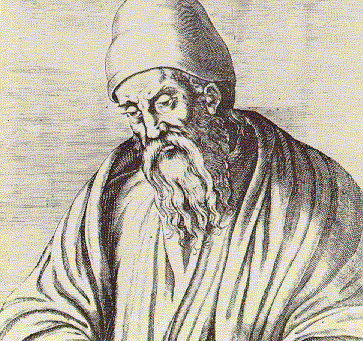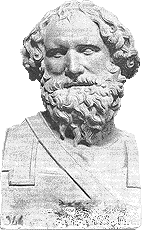Site about Music - Art & Math


 (/ˈpleɪtoʊ/; Greek: Πλάτων, Plátōn, "broad"; 428/427 or 424/423 BC[a] – 348/347 BC) was a philosopher, as well as mathematician, in Classical Greece and an influential figure in philosophy, central in Western philosophy.
(/ˈpleɪtoʊ/; Greek: Πλάτων, Plátōn, "broad"; 428/427 or 424/423 BC[a] – 348/347 BC) was a philosopher, as well as mathematician, in Classical Greece and an influential figure in philosophy, central in Western philosophy.
He was Socrates' student, and founded the Academy in Athens, the first institution of higher learning in the Western world. Along with Socrates and his most famous student, Aristotle, Plato helped to lay the foundations of Western philosophy and science.
His notable and influential work is the theory of Forms, which began a unique perspective on abstract objects, and led to a school of thought called Platonism. A Platonic solid is a convex multifaceted 3-D object whose faces are all identical polygons, with sides of equal length and angles of equal degrees.
A Platonic solid also has the same number of faces meeting at every vertex. The best-known example of a Platonic solid is the cube. Whose faces are six identical squares.
 (/ˈærɪˌstɒtəl/;[1] Greek: Ἀριστοτέλης [aristotélɛːs], Aristotélēs; 384–322 BCE) was a Greek philosopher and scientist born in Stagirus, northern Greece. Aristotle was a pupil of Plato, and a teacher of Alexander the Great. What we today call Aristotelian logic, Aristotle himself would have labeled "analytics".
(/ˈærɪˌstɒtəl/;[1] Greek: Ἀριστοτέλης [aristotélɛːs], Aristotélēs; 384–322 BCE) was a Greek philosopher and scientist born in Stagirus, northern Greece. Aristotle was a pupil of Plato, and a teacher of Alexander the Great. What we today call Aristotelian logic, Aristotle himself would have labeled "analytics".
The term "logic" he reserved to mean dialectics. Aristotle actually systematized the study of logic, which dominated scientific reasoning in the Western world for 2,000 years. The Organon (Greek: Ὄργανον, meaning "instrument, tool, organ") is the standard collection of Aristotle's six works on logic.
 /ˈjuːklɪd/; Greek: Εὐκλείδης Eukleidēs; ( c.325B.C.-c.270B.C.), also known as Euclid of Alexandria, was a Greek mathematician, often referred to as the "Father of Geometry". His Elements is one of the most influential works in the history of mathematics. He also wrote works on perspective, conic sections, spherical geometry, number theory and rigor.
/ˈjuːklɪd/; Greek: Εὐκλείδης Eukleidēs; ( c.325B.C.-c.270B.C.), also known as Euclid of Alexandria, was a Greek mathematician, often referred to as the "Father of Geometry". His Elements is one of the most influential works in the history of mathematics. He also wrote works on perspective, conic sections, spherical geometry, number theory and rigor.
 Greek: Ἀρχιμήδης; c.(287 BC – c. 212 BC) was an Ancient Greek mathematician, physicist, engineer, inventor, and astronomer.Although few details of his life are known, he is regarded as one of the leading scientists in classical antiquity.
Greek: Ἀρχιμήδης; c.(287 BC – c. 212 BC) was an Ancient Greek mathematician, physicist, engineer, inventor, and astronomer.Although few details of his life are known, he is regarded as one of the leading scientists in classical antiquity.
In 1941, mathematician G.H.Hardy wrote, “ Archimedes will be remembered when Aeschylus is forgotten, because languages die and mathematical ideas do not. “Immortality” may be a silly word, but probably a mathematician has the best chance of whatever it may mean.”Archimedes is famous for his contemplation of tremendously large numbers. In his book “ The Sand Reconer”, Archimedes estimated that 8× 10³³ grains of sand would fill the universe. Archimedes anticipated modern calculus and analysis by applying concepts of infinitesimals and the method of exhaustion to derive and rigorously prove a range of geometrical theorems, including the area of a circle, the surface area and volume of a sphere, and the area under a parabola.
From http://www.storyofmathematics.com/greek.html